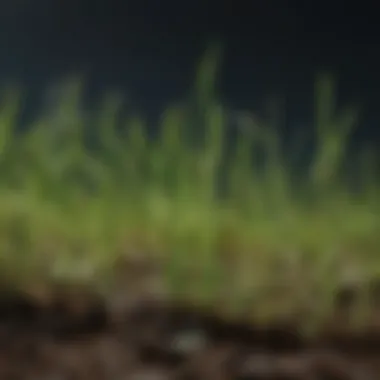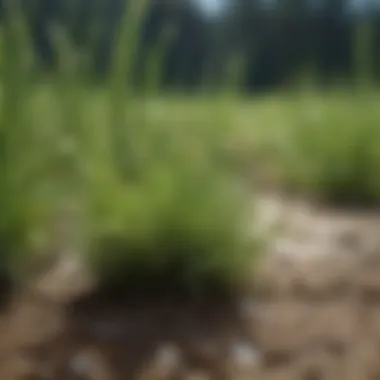Understanding the Germination Timeline of Bermuda Grass


Intro
Germination is a crucial phase in establishing any grass type, including Bermuda grass. Understanding how and when Bermuda grass seeds sprout can profoundly impact lawn aesthetics and health. Homeowners and gardeners need to be aware of the key factors that contribute to the germination timeline like temperature, moisture levels, and overall care practices.
The timeline for Bermuda grass seed germination typically ranges from 7 to 12 days. However, achieving optimal results relies heavily on understanding the environmental conditions conducive to sprouting. This article will guide you through the significant factors affecting germination, potential troubleshooting tips, and the timing necessary for successful lawn establishment.
Key Factors to Consider
Several factors play an essential role in the germination process:
- Temperature: Bermuda grass seeds germinate best when soil temperatures are between 65°F and 75°F, though they can tolerate slightly higher ranges.
- Moisture: Consistent moisture is necessary for seeds to sprout. It is vital not to oversaturate, as this leads to seed rot.
- Light: Bermuda grass does not require light to germinate, but exposing young seedlings to adequate light encourages healthy growth once they have sprouted.
Addressing these factors accurately sets you on the right path to a flourishing Bermuda grass lawn.
Intro to Bermuda Grass Seed
Bermuda grass is a popular choice for lawns due to its resilience and adaptability. Understanding the germination process of Bermuda grass seed is essential for anyone looking to cultivate a lush and healthy lawn. The germination timeline provides insights into how long it takes for the seeds to sprout and thrive. This knowledge can help homeowners plan their seeding activities effectively.
What is Bermuda Grass?
Bermuda grass (Cynodon dactylon) is a warm-season grass that thrives in sunny environments. It is characterized by its fine texture and dark green color, making it an appealing choice for a variety of landscapes. Bermuda grass is well-suited for regions with hot summers and is often used in lawns, sports fields, and golf courses because of its durability.
It grows vigorously during the warm months, forming a dense turf that can withstand heavy foot traffic. This grass type is hardy and requires full sun to perform at its best. Some varieties are also tolerant to drought and can recover quickly from damage, making it a practical choice for many homeowners.
Common Uses of Bermuda Grass
Bermuda grass has several notable applications, making it a versatile choice in landscaping and turf management.
- Residential Lawns: Many homeowners favor Bermuda grass for its aesthetic appeal and durability, providing a beautiful lawn that can withstand various conditions.
- Sports Fields: Its ability to recover quickly from wear makes it the preferred choice for athletic fields. Sports like football and soccer often feature Bermuda grass due to its toughness.
- Golf Courses: The grass is commonly used on golf fairways and greens. Its low growth habit allows for smooth putting surfaces and quick recovery from divots.
- Parks and Recreation Areas: Bermuda grass is often used in parks and public spaces where high traffic is expected. Its resilience helps maintain a healthy appearance.
In summary, Bermuda grass is more than just a lawn choice; it serves multiple functions in sports and leisure, enhancing the environments where it is grown.
Germination Process Overview
The germination of Bermuda grass seed is a crucial step in establishing a lush, green lawn. Understanding this process helps homeowners and garden enthusiasts ensure successful sprouting and growth. In this section, we will dissect the stages of seed germination and highlight factors that can influence this vital phase.
Stages of Seed Germination
Germination is not just a single event but a sequence of stages that a seed undergoes until it grows into a plant. This process can be broken down into three primary stages:
- Imbibition: During this stage, the seed absorbs water, causing it to swell. This is essential because the seed requires moisture to activate its metabolism.
- Activation: After imbibition, biochemical processes in the seed start. Enzymes become active, and the stored food in the seed is converted into energy that fuels growth.
- Emergence: Finally, the root begins to grow downward to anchor the plant, while the shoot pushes upward to reach light. This marks the transition from seed to seedling, indicating that the germination process is complete.
Understanding these stages allows gardeners to monitor their seeds effectively, ensuring they provide the right conditions for optimal development.
Factors Influencing Germination
Numerous factors can affect the germination of Bermuda grass seeds. These include:
- Temperature: Bermuda grass seeds have specific temperature requirements for ideal germination. Warm soil temperatures, generally between 65°F and 75°F, enhance the rate and success of germination.
- Moisture Levels: Adequate moisture is critical. Seeds need consistent moisture in the soil to germinate effectively. Too much or too little water can hinder this process.
- Soil Quality: The nutrient content, texture, and drainage capabilities of the soil can significantly impact seed germination. Well-drained, loamy soils are preferred for Bermuda grass.
- Oxygen: Seeds require oxygen for respiration during germination. Compacted or waterlogged soils can restrict airflow, leading to poor germination rates.
- Light: Though Bermuda grass seeds do not need light to germinate, light conditions can affect the subsequent growth of seedlings.
"The combination of optimal temperature, moisture, and soil quality forms the bedrock of successful germination."
Taking these factors into account during the germination phase is essential for ensuring that seeds sprout and subsequently thrive. Proper attention to these details leads to a healthier and more resilient lawn, enhancing the reasons for lawn maintenance and the overall aesthetic appeal of outdoor spaces.
How Long Does It Take for Bermuda Seed to Sprout?


Understanding how long it takes for Bermuda seed to sprout is crucial for successful lawn establishment. The timelines and factors involved play a significant role in planning and managing the growth process. Knowing the expected durations allows homeowners to strategize their seeding and maintenance practices efficiently.
In general, Bermuda grass seeds can take anywhere from 7 to 14 days to germinate under optimal conditions. However, numerous elements influence this timeframe, including temperature, moisture, and soil quality. Recognizing these factors will help you achieve the desired results.
Typical Timeline for Germination
The typical germination period of Bermuda grass seed varies according to various climates and care practices. Under ideal conditions—specifically, when soil temperatures are within the 65°F to 75°F range—sprouting can be observed within 7 to 12 days. For seeds planted when the soil temperature falls below this range, the timeline can extend to 14 to 21 days.
During the germination phase, it’s essential to ensure that the seeds remain moist but not soaked. This balance significantly impacts the speed and success of sprouting. Once the seeds begin to germinate, tiny shoots will eventually emerge. These shoots will grow into young plants, establishing a new lawn.
Research indicates that maintaining optimal conditions can reduce germination times, providing a healthier starting point for the grass.
Variations Based on Environmental Conditions
Environmental conditions play a pivotal role in how long it takes for Bermuda grass seed to sprout. Factors like light exposure, humidity, and soil health can either expedite or delay the germination process.
- Temperature: As mentioned, the ideal soil temperature is critical. Warmer temperatures promote faster germination, while cooler soils slow down the process.
- Moisture Levels: Insufficient or excessive moisture can hinder germination. Consistent watering should be applied, ensuring the soil remains adequately moist. Consider using a light misting technique to avoid displacing the seeds.
- Soil Type: A well-aerated and well-draining soil provides the best outcomes. Soil compacted heavily can trap moisture and impede seed growth.
- Light: Bermuda grass generally prefers full sun. Seeds planted in shaded areas may struggle to sprout as effectively.
Understanding these environmental variances enables effective decision-making, enhancing the likelihood of timely sprouting and a robust lawn.
By being informed about the germination timeline, homeowners can set themselves up for a successful Bermuda grass lawn. Efficient planning based on this knowledge ultimately leads to a flourishing, healthy grass area in your yard.
Optimal Conditions for Germination
Understanding optimal conditions for the germination of Bermuda grass seed is pivotal for achieving a lush, green lawn. Bermuda grass is notably popular in warm regions due to its resilience and adaptability. However, the success of germination largely hinges on the right environmental factors, which include temperature, moisture, and soil type. When these factors align, the seeds have a greater chance of sprouting effectively, leading to a more robust lawn.
Ideal Temperature Ranges
The germination of Bermuda grass seed is highly influenced by temperature. The ideal range is often between 65°F and 75°F (approximately 18°C to 24°C). Within this range, the metabolic processes of the seeds activate, allowing them to begin sprouting. Temperature extremes, particularly cold, can delay or completely halt germination.
Bermuda grass is primarily a warm-season grass. It thrives in warm conditions, which means that planting in the early spring, once soil temperatures consistently reach the optimal range, often yields the best results.
It is helpful to monitor soil temperature closely, especially utilizing a soil thermometer, to determine the best timing for sowing seeds. This proactive approach can prevent disappointment from a failed germination period.
Moisture Requirements
Moisture is another critical factor impacting germination success. Bermuda grass seeds require consistent moisture to begin the germination process. It is essential to keep the top 1 inch of soil consistently moist. This can be achieved with light watering, ideally several times a day to avoid water logging, which can drown seeds and lead to issues like rot.
Initial watering should be gentle so as not to displace the seeds. Once the seeds start to sprout, transitioning to deeper watering is recommended. Maintaining moisture helps the roots establish themselves firmly, ensuring optimum growth and overall lawn health.
Soil Type Considerations
The type of soil also plays a vital role in the germination of Bermuda grass seeds. Ideally, the soil should be well-drained and rich in organic matter. Sandy loam soils often provide an excellent balance for Bermuda grass, allowing for proper drainage while retaining necessary moisture.
Before seeding, conduct a soil test to identify pH levels and nutrient content. Bermuda grass flourishes in a pH range of 6.0 to 7.0. If modifications are necessary, amend the soil accordingly to create a conducive growth environment.
Using an appropriate starter fertilizer can also provide crucial nutrients that boost early growth. A balanced product, low in nitrogen but high in phosphorus, helps in root establishment and promotes healthy sprout development.
Proper soil preparation, including understanding temperature, moisture, and soil type, lays the foundation for successful Bermuda grass cultivation.
By paying attention to these optimal conditions for germination, homeowners can successfully cultivate a healthy Bermuda grass lawn. Each factor intertwines, contributing to the overall performance and appearance of the grass, which is the ultimate goal for any gardening enthusiast.
Preparation Before Seeding
Preparation before seeding Bermuda grass seed is crucial. It is not just a step but a foundation for successful germination and growth. By taking the time to prepare properly, one can create an environment that supports the healthy development of the grass. This not only ensures faster germination but also improves the resilience of the grass in the long term.


One of the key aspects of preparation is the condition of the soil. Healthy soil fosters strong root development. It allows seeds to access the nutrients and moisture essential for growth. Ignoring this step can lead to poor germination rates and wasted resources. Proper preparation may also reduce the need for excess fertilization or pest control measures later on.
Soil Testing and Preparation
Soil testing is an essential component of preparation. It helps identify the pH levels and nutrient content of the soil. This knowledge enables one to make informed decisions about amendments. Proper soil pH for Bermuda grass typically falls between 6.0 and 7.0. If the pH is too low, lime can be added to raise it. Conversely, sulfur can help acidify overly alkaline soils.
Once the soil is tested, it is time for physical preparation. Removing debris, such as rocks and weeds, is vital. This helps create a clean seedbed. Tilling the soil is often recommended to aerate it. This promotes better seed-to-soil contact, which is necessary for effective germination.
"Proper soil preparation reduces the risk of compaction and ensures better water absorption during the germination process."
After tilling, one should consider leveling the surface to avoid pooling water, which can hinder seed sprouting. Compacted soil can impede growth and reduce the efficiency of water and nutrient uptake.
Seed Selection and Quality
Choosing quality seed is equally important as soil preparation. Not all Bermuda grass seeds are created equal. Factors like genetic purity, germination rates, and adaptability to regional climates can affect the outcome. Select seeds that are certified and free from contaminants.
Quality seeds typically have higher germination rates. This means a denser and more robust lawn. It is also wise to consider the specific type of Bermuda grass. For instance, 'Tifway 419' is known for its drought resistance and high traffic tolerance. On the other hand, 'Celebration' offers vivid color and resilience in warmer climates.
When purchasing seeds, check for the packaging date. Fresh seeds are more likely to germinate than those that have been stored for extended periods. This factor can be crucial in achieving a successful establishment of Bermuda grass.
In summary, preparation before seeding cannot be overlooked. From soil testing to seed quality, each step contributes to the overall health and vitality of Bermuda grass. Understanding these components allows homeowners and gardening enthusiasts alike to establish lush, green lawns with a solid foundation.
Care During the Germination Phase
Caring for Bermuda grass seeds during the germination phase is crucial. This stage shapes the foundation for strong, healthy grass growth. Proper care helps to establish a robust lawn that can withstand environmental challenges. It ensures that the seeds germinate effectively and the young grass develops a strong root system.
Watering Techniques
Watering is a vital part of the care process. The right amount of moisture is necessary for seed germination. Too little water can dry out the seeds, while too much can lead to rot. It's essential to maintain a balanced moisture level.
- Frequency: Initially, light, consistent watering is needed. Watering once or twice a day might be necessary, depending on the weather.
- Amount: Aim for about a quarter inch of water daily. This can vary, so monitoring soil moisture is key.
- Timing: Early morning is the best time to water. This allows time for the grass to absorb moisture before the heat of the day.
Using a sprinkler system can help assure even coverage. Alternatively, a garden hose with a spray attachment can work well for smaller areas. Adjust the watering schedule based on rainfall and humidity levels.
Preventing Soil Compaction
Soil compaction is another concern during germination. Compacted soil can restrict root growth and water movement. Therefore, it’s important to take steps to keep the soil loose.
- Avoid Foot Traffic: Limit walking on the seeded area. This helps prevent compressing the soil.
- Tilling the Soil: Before planting, loosening the soil can help. Using a rake or garden tiller creates space for roots to expand.
- Using a Roller: If you need to compact the soil lightly, use a roller after seeding to ensure even coverage without overdoing it.
Maintaining a healthy balance in soil structure is essential for optimal grass performance.
By focusing on proper watering techniques and preventing soil compaction, stakeholders can significantly improve the success rate of Bermuda grass seed germination. These preparations influence overall lawn establishment, leading to a lush and resilient landscape.
Troubleshooting Germination Issues
Understanding troubles that may arise during the germination of Bermuda grass seed is crucial for ensuring a successful lawn establishment. Even with optimal conditions in place, various factors can hinder seed sprouting and lead to disappointment. By recognizing common problems and their solutions, gardeners can avoid wasting time and resources, and ensure their efforts yield vibrant, lush grass.
Common Problems and Solutions
Several issues can affect the germination of Bermuda grass seeds. Addressing these promptly can save serious setbacks. Here are some frequently encountered problems:
- Poor Seed Germination Rate: Sometimes, not all seeds sprout. This can be due to old or low-quality seeds. Always choose fresh seeds from reputable sources. Testing seeds by sprouting a few in a damp paper towel can indicate viability.
- Insufficient Moisture: Seeds need consistent moisture to germinate. Dry conditions can prevent growth. The solution is simple: Regularly check soil moisture, ensuring it stays damp but not waterlogged during the germination period.
- Soil Compaction: Compacted soil can restrict roots and hinder germination. Aerating the soil before planting helps create a better environment for seeds. The use of a shovel or core aerator can achieve this effectively.
- Extreme Temperatures: Both excessively high and low temperatures can be detrimental. Bermuda grass seeds prefer temperatures between 75°F and 85°F. If conditions are too extreme, consider waiting for milder weather for planting.
- Inadequate Light: While seeds need warmth and moisture, they also require light. If planted too deeply, they may not receive enough light to germinate. Plant Bermuda grass seeds at the recommended depth, which is typically 1/4 to 1/2 inch.
Identifying Pests and Diseases


Pests and diseases pose a serious threat to germination and the overall health of Bermuda grass. Early identification can lead to more effective management and can be key in maintaining a healthy lawn. Some common issues include:
- Grubs or Beetles: These pests can damage young seeds or seedlings. Look for irregular patches or areas where grass appears to be wilting. Treating with appropriate insecticides can control pest populations.
- Fungal Diseases: Soil-borne fungi, such as damping off, can destroy seedlings. Symptoms may include wilting or discoloration. Ensuring good drainage and avoiding overwatering are vital steps.
- Weeds Competing for Resources: Weeds can outcompete Bermuda grass for light, moisture, and nutrients. Implement pre-emergent herbicides before seeding to prevent weed emergence.
- Sandy or Poor Soil Conditions: If soil lacks nutrients, seedlings may weaken. Conduct a soil test to assess nutrient content, and amend soil as needed with fertilizers or organic matter.
By understanding these potential troubles, homeowners and gardening enthusiasts can mitigate risks and enhance their chance for success.
Taking proactive measures allows for seamless germination. Addressing issues promptly can determine the difference between disappointment and thriving grass growth. Proper care and vigilance during this phase is crucial for a successful lawn.
The Importance of Timing in Germination
Timing plays a crucial role when it comes to the germination of Bermuda grass seed. Successful establishment of a lush, green lawn is not just about the right soil, moisture, or seed quality. It largely depends on choosing the optimum period for planting. Understanding the timing factors involved can make significant difference in rates of germination, growth, and overall lawn health.
Germination needs specific conditions that can vary not just seasonally but also regionally. Being mindful of these aspects ensures that seeds are sown when they are likeliest to thrive. Planning for the right timing can also help in reducing maintenance efforts down the line. When grass seeds germinate at the right time, they experience less stress from environmental conditions, which leads to more robust plant growth.
Seasonal Considerations
Bermuda grass thrives in warm environments. Therefore, spring and early summer are the best seasons for sowing seeds in many regions. The soil temperature should be consistently around 65 degrees Fahrenheit for optimal germination. Planting too early in the season, while the ground is still cool, can lead to poor germination.
It is also important to consider the local climate during planting.
- In warmer climates, sowing in late spring may yield the best results.
- Colder regions may require waiting until temperatures warm sufficiently in early summer.
Planting during the proper season can capitalize on rainfall patterns or irrigation availability, reducing the need for supplemental watering. Therefore, timing becomes an essential factor in ensuring that Bermuda grass will not only germinate but also flourish.
Regional Variations in Germination Rates
Regional climate variations significantly affect Bermuda grass germination rates. What works in one state may not perform well in another due to differences in temperature, humidity, and rainfall.
- For instance, in the southern states like Texas and Florida, Bermuda grass seeds can germinate effectively from late spring through early summer.
- In contrast, regions with a cooler climate, such as northern states, may see a shorter window for ideal germination.
Local factors like elevation and humidity also play roles in this regard. Homeowners in drier climates should pay extra attention to soil moisture during the germination process. Each unique region will require careful observation and planning regarding when to sow seeds for best outcomes.
Culmination
In summation, the germination timeline of Bermuda grass seed unfolds as a crucial topic for both seasoned gardeners and novices alike. The journey from seed to lush grass involves various stages, influenced by multiple factors. Understanding these elements is key to cultivating healthy lawns.
Recap of Key Points
- Bermuda grass requires precise conditions for optimal growth, including temperature, moisture, and soil quality.
- The germination process entails specific stages that must be monitored closely to identify any potential issues.
- Timing is a significant factor; selecting the right season can drastically affect the germination rates.
Through comprehending the timeline and conditions essential for Bermuda grass seed germination, one can avoid common pitfalls and achieve a verdant landscape.
Final Thoughts on Bermuda Grass Cultivation
Cultivating Bermuda grass successfully hinges on understanding the intricacies of its germination. Consistent monitoring of environmental variables will enhance the chances of a flourishing lawn. Moreover, patience plays an important role; waiting for the right conditions can yield impressive results.
The knowledge gathered from this article arms you with insights that can transform your gardening practices. Engage with resources to keep learning, ensuring that your efforts in cultivating Bermuda grass are met with success.
Further Reading on Grass Types
Understanding the different types of grass is paramount for anyone interested in gardening. Each type has specific requirements regarding light, water, and nutrients. Bermuda grass, for instance, thrives in warmer climates and requires a specific maintenance regimen. To delve deeper into this topic, consider the following resources:
- Wikipedia: An excellent starting point for basic definitions and classifications of grass types. It offers comprehensive entries about Bermuda grass, its characteristics, and care.
- Britannica: A more detailed examination of grass species and their ecological significance can be found here. This resource also explores the practical uses of various grass types in landscaping and sports fields.
- Reddit Communities: Engaging with dedicated gardening forums can provide practical advice and peer experiences that enhance theoretical knowledge. Users share personal insights and solutions to common issues encountered in their gardening journeys.
Accessing these materials not only informs but also aids in making sound decisions when selecting the appropriate grass type for one’s lawn or garden.
Useful Tools for Gardeners
Effective gardening often hinges on using the right tools. A well-equipped gardener maximizes efficiency and ensures proper care for their plants. Below are some essential tools and resources:
- Soil Test Kits: These allow gardeners to assess pH levels and nutrient content in the soil, which is crucial for Bermuda grass growth. Knowing the soil composition helps in making informed amendments.
- Moisture Meters: These handy devices measure the moisture level in the soil, ensuring the right amount of watering.
- Fertilization Tools: Proper fertilizing tools can enhance nutrient delivery to the grass, supporting robust growth and resilience.
- Online Gardening Apps: Many apps provide reminders for watering, fertilizing, and pest control. They can also offer tailored advice based on specific geographical locations.
Using the right equipment and innovative tools can make a significant difference in the results of lawn cultivation. With these resources, both novice and experienced gardeners can foster a vibrant and healthy Bermuda grass lawn.















